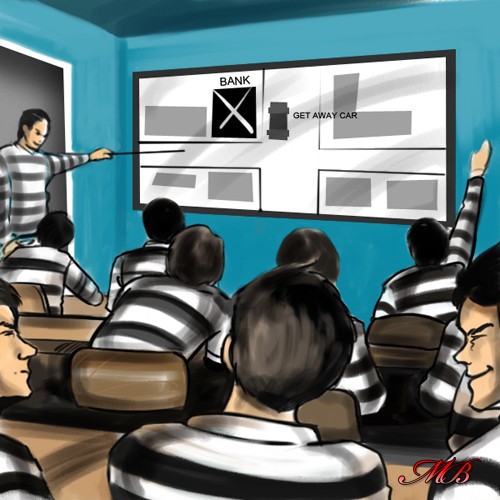
Punishment: First US state to pass a law that prohibits the sentencing of convicts to prison as a
form of punishment. Instead, the law states that prisons are to only be used when the convict is a real threat to society. If the convict is only a threat to himself, they are to be institutionalized in a psychiatric ward until they are no longer a danger to themselves. For those criminals who are not a real threat to society, the courts are to punish them in a way that doesn't damage their ability to be a productive and accepted member of society. If the court believes the convict is likely to repeat the crime, the court can sentence them to house arrest to control their movements, associations, and monitor their conduct until they prove themselves responsible while still enabling them to continue their jobs or get a law-abiding job. If the court determines that the convict currently lives in an environment that will only cause him to revert back to crime, the law gives the court the authority to relocate the convict to a different community within the state and prohibit them from interacting with known associates deemed to be a bad influence on the convict to help give the convict a fresh start on life.
Future Challenges:
1) First major US state (9 million or more) to pass the above law by legislative action or citizen-initiated state-wide referendum.
2) First US House Representative or US Senator to introduce a bill to the US Congress, get it passed, and signed by the US President which does the above challenge at the federal level. If the federal court determines that the convict currently lives in an environment that will only cause him to revert back to crime, the federal law gives the court the authority to relocate the convict to a different faraway state and prohibit the convict from interacting with known associates deemed to be a bad influence on the convict to help give the convict a fresh start on life.
3) First TV documentary to chronicle the court trials and lives of a small number of convicts who would have normally been sent to prison but weren't due to the above law. The documentary must have a female convict be one of those profiled and another convict who is relocated to another community to remove him/her from a bad environment. None of the profiled convicts can be convicted of the same crime.
First nationally syndicated US talk show host to champion this challenge and to:
4) Read on the air during each of their programs at least one name and crimes of non-violent prisoner currently serving time in prison for a consensual crime(s) and how much their imprisonment has so far cost taxpayers. The host encouraging listeners to send care packages to the prisoner to help them endure their wrongful imprisonment and telling listeners how exactly and where to send such packages.
5) Interview on the air during at least one of their programs each week at least one non-violent prisoner currently serving time in prison for a consentual crime(s). The host telling viewers how much the wrongfully-imprisoned prisoner has so far cost taxpayers. The host also encouraging listeners to send care packages to the prisoner to help them endure their wrongful imprisonment and telling listeners how exactly and where to send such packages.
Having them on their show for at least fifteen minutes, first nationally syndicated US talk show host to champion this challenge and get:
6) Get a sitting US governor on her/his show and encourage her/him to do at least the original challenge. To win this future challenge, the governor has to be on the show for at least fifteen minutes.
7) A member of the US House Judiciary Committee or the US Senate Judiciary Committee on their show and encourage them to do Future Challenge #2. To win this future challenge, the congressperson has to be on the show for at least fifteen minutes.
8) Get the Chair or Vice Chair of either the US House Judiciary Committee or the US Senate Judiciary Committee on their show and encourage them to do Future Challenge #2. To win this future challenge, the (Vice) Chair has to be on the show for at least fifteen minutes.
9) Get both Chairs and both Vice Chairs of the US House Judiciary Committee and the US Senate Judiciary Committee on their show and encourage them to do Future Challenge #2. To win this future challenge, the Chairs and Vice Chairs must be on the show for at least thirty minutes.
